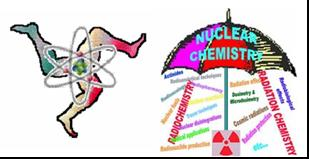Speaker
Boris Zhuikov
(Institute for Nuclear Research of Russian Academy of Sciences)
Description
Production of isotopes for medical diagnostics and therapy is located in several institutions based on big nuclear facilities all over Russia earlier used for weapon and fundamental research, in particular:
● Research Institute Atomic Reactors (Dimitrovgrad): nuclear reactors, hot cells;
● Karpov Institute of Physical Chemistry (Obninsk branch): nuclear reactor, hot cells;
● Institute for Physics and Power Engineering (Obninsk): hot cells;
● CYCLOTRON Co. (Obninsk): cyclotrons, hot cells;
● Production Association MAYAK (Ozersk): nuclear reactors, hot cells;
● Kurchatov Institute (Moscow): solution reactor, cyclotron, hot cells;
● Khlopin Radium Institute (S-Petersburg): cyclotron, hot cells;
● Institute for Nuclear Research (Troitsk): linear accelerator.
Most of isotopes are produced for export needs. Future growing of nuclear medicine in Russia is anticipated. New prospective developments are: production of fission 99Mo in Dimitrovgrad; production of 82Sr, 117mSn and 225Ac at INR together with IPPE providing basing on new effective target and radiochemical technology. Also very successful are developments of 68Ge/68Ga-generator at CYCLOTRON Co. and 82Sr/ 82Rb-generator at INR together with Central Research Institute of Roentgenology and Radiology (S-Petersburg) for PET-diagnostics.
This progress will provide supplying a big fracture of medical isotopes in the world market, especially if new ambitious projects will be approved. Collaboration with North American and European companies and laboratories plays an important role.
Primary author
Boris Zhuikov
(Institute for Nuclear Research of Russian Academy of Sciences)




